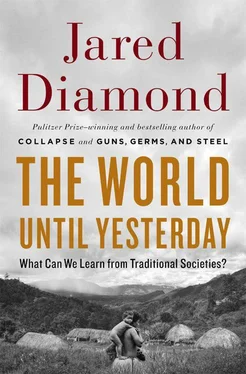At minimum, I hope that you will come to share my fascination with the different ways in which other peoples have organized their lives. Beyond that fascination, you may decide that some of what works so well for them could also work well for you as an individual, and for us as a society.
PART ONE

SETTING THE STAGE
BY DIVIDING
SPACE
CHAPTER 1
Friends, Enemies, Strangers, and Traders
A boundary

Mutually exclusive territories

Non-exclusive land use

Friends, enemies, and strangers

First contacts

Trade and traders

Market economies

Traditional forms of trade

Traditional trade items

Who trades what?

Tiny nations
Over much of the world today, citizens of many countries can travel freely. We face no restrictions on travel within our own country. To cross the border into another country, either we arrive unannounced and just show our passport ( Plate 34), or else we have to obtain a visa in advance but can then travel without restrictions in that other country. We don’t have to ask permission to travel along roads or on public land. The laws of some countries even guarantee access to some private lands. For instance, in Sweden a land-owner can exclude the public from his fields and gardens but not from his woods. We encounter thousands of strangers every day and think nothing of it. All of these rights we take for granted, without reflecting on how unthinkable they were almost everywhere in the world throughout human history and still are in parts of the world today. I’ll illustrate traditional conditions of land access by my experiences while visiting a mountain village in New Guinea. Those traditional conditions set the stage for understanding war and peace, childhood and old age, dangers, and all the other features of traditional societies that we shall explore in the remainder of this book.
I had come to the village in order to survey birds on the ridge rising immediately to the south. On the second day after my arrival, a few villagers offered to guide me along an established trail up to the ridge crest, where I would pick a campsite for my surveys. The trail climbed through gardens above the village, then entered tall primary forest. After an hour and a half of steep climbing, we passed an abandoned hut in the middle of a small overgrown garden just below the ridge-line, at which the trail of our ascent ended in a T-junction. To the right from the junction, a good trail continued along the ridge-line.
Several hundred yards along that trail, I picked out a campsite just north of the ridge-line, i.e., on the side towards my new friends’ mountain village. In the opposite direction, to the south of the trail and ridge-line, the ridge sloped gently downhill through tall forests traversed by a gully in which I could hear from below the sound of a stream. I was delighted to have found such a beautiful and convenient site, at the highest local elevation and thus with the best chance of locating high-altitude bird species, offering easy access to gentle terrain good for bird-watching, as well as a nearby source of water for drinking, cooking, washing, and bathing. And so I proposed to my companions that, on the following day, I move up to the campsite and spend a few nights there along with two men to point out birds and to maintain the camp.
My friends nodded in agreement until I came to the mention of just two men staying in camp with me. At that point they shook their heads and insisted that this was a dangerous area, and that my camp had to be protected by many armed men. What a dreadful prospect for a bird-watcher! If there were many people, they would inevitably make noise, talk constantly, and scare birds away. Why, I asked, did I need such a large entourage, and what was so dangerous about this beautiful and innocent-looking forest?
The prompt answer: at the base of the ridge’s far side (its south side) were villages of bad people referred to as river people, enemies of my mountain friends. River people killed mountain people mainly by poison and sorcery, not by fighting openly with weapons. But the great-grandfather of one young mountain person had been shot and killed with arrows as he was sleeping in his garden hut some distance from the mountain village. The oldest man present during our conversation recalled seeing, as a child, the great-grandfather’s body with the arrows still in him after he had been brought back to the village, and recalled people crying over the body, and his own fear.
Would we have the “right,” I wondered, to camp on the ridge? The mountain people replied that the ridge-line itself formed the boundary between their own territory on the ridge’s north slope and the territory of the bad river people on the south slope. But the river people claimed some of the mountain people’s land beyond the ridge-line on the north side. Did I remember that abandoned hut and the overgrown garden just below the ridge-line? my friends asked. That hut and garden had been made by the evil river people, as a way of asserting their claim to land on the north side as well as on the south side of the ridge-line.
From my previous unpleasant experiences over perceived territorial trespassing in New Guinea, I realized that I had better take this situation seriously. Anyway, regardless of how I might assess the danger myself, the mountain people weren’t going to let me camp on that ridge without a strong escort. They demanded that I be accompanied by 12 men, and I responded with a proposal of 7 men. We ended up “compromising” between 12 and 7: by the time that our camp was established, I counted about 20 men staying in camp, all armed with bows and arrows, and joined by women to do cooking and to fetch water and firewood. Furthermore, I was warned not to step off the ridge-line trail into that nice-looking forest on the gentle south slope. That forest unequivocally belonged to the river people, and it would cause big trouble, really big trouble, if I were caught trespassing there, even if just to watch birds. Also, the mountain women in our camp couldn’t fetch water from the nearby gully on the south slope, because that would constitute not only trespass but also removal of valuable resources, for which a compensation payment would be due if the matter could be settled amicably at all. Instead, the women walked every day all the way back down to the village and carried 20-liter water containers 1,500 vertical feet uphill to our campsite.
On my second morning in camp there was some heart-pounding excitement that taught me how territorial relations between mountain people and river people were more complicated than just black-and-white claims of complete mutual exclusion from each other’s land. With one of the mountain men I went back to the trail T-junction and continued left along the ridge-line to clean up an old trail that had become overgrown. My mountain companion didn’t seem worried about our being there, and I figured that, even if river people found us there, they shouldn’t object to our standing on the ridge-line as long as we didn’t stray over to their side. But then we heard voices coming uphill from the south side. Uh-oh! River people!! If they carried on uphill as far as the ridge-line and T-junction, they would see the signs of fresh trail clearance and track us down, we’d be trapped there, they might consider us as violating their territory, and who knew what action they would take.
Читать дальше


 Mutually exclusive territories
Mutually exclusive territories 








